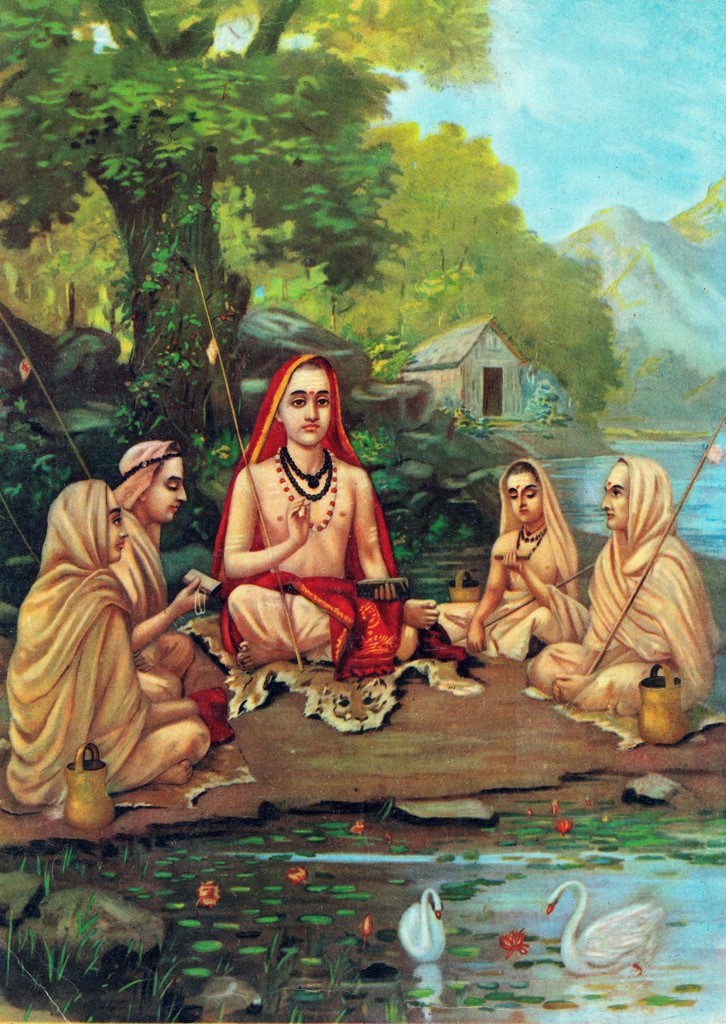Description

Disclaimer: Copyright infringement not intended.
Context
The four shankaracharyas have said that they will not attend the inauguration of the Ram temple in Ayodhya on January 22.
Details
Etymology
- Word Composition: Shankaracharya consists of two parts — Shankara and Acharya.
- Acharya: Sanskrit for "teacher."
- Shankara: Refers to Adi Shankara, the philosopher and theologian.
- Meaning: Shankaracharya translates to "teacher of the way of Shankara," signifying individuals who carry forward the teachings and legacy of Adi Shankara in the Advaita Vedanta tradition.
- Usage of the term: Religious title for the heads of amnaya monasteries (mathas) in the Advaita Vedanta tradition of Hinduism.
Historical Background
- Founder: Adi Shankara.
- Tradition Establishment: In the 16th century, Adi Shankara is traditionally believed to have set up four monasteries or mathas in different regions of India.
- Purpose: These mathas were established to be held by realized individuals known as Shankaracharyas, who would serve as spiritual teachers and be available for consultations on matters of spirituality.

Four Main Shankaracharya Amnaya Mathas: The four mathas were established in the North, South, East, and West of India, each associated with a specific Vedic tradition (Veda) and a core philosophical statement (Mahāvākya).
- Puri Govardhanmaṭha Pīṭhaṃ (East):
- Mahāvākya: Prajñānam brahma (Consciousness is supreme being).
- Veda: Rig Veda.
- Sampradaya:
- The Puri matha emphasizes the worship of Lord Jagannath and the promotion of spiritual knowledge.
- Sringeri Śārada Pīṭhaṃ (South):
- Mahāvākya: Aham brahmāsmi (I am the supreme being).
- Veda: Yajur Veda.
- Sampradaya:
- The Sringeri matha is responsible for spiritual guidance, preservation of Vedic traditions, and administration in the southern region of India.
- Dvāraka Sharada Pīṭhaṃ (West):
- Mahāvākya: Tattvamasi (That thou art).
- Veda: Sama Veda.
- Sampradaya:
- The Dwarka matha focuses on the study and propagation of Advaita Vedanta in the western region of India.
- Badari Jyotirmaṭha Pīṭhaṃ (North):
- Mahāvākya: Ayamātmānam brahma (This Atman is supreme being).
- Veda: Atharva Veda.
- Sampradaya:
- The matha is situated in the northern part of India and plays a role in preserving Vedic traditions and knowledge.
Adi Shankara
- Birth and Early Life: Born in Kalady, Kerala, Adi Shankara is said to have taken sanyas (ascetic life) after a crocodile incident.
- Travels: Adi Shankara traveled extensively, challenging prevailing philosophical traditions and establishing mathas across India, from Kanchi to Kamrup, and from Kashmir to Kashi and Puri.
- Works: Attributed with 116 works, including commentaries on Upanishads, Brahmasutra, and Bhagavad Gita. Some authorship remains disputed.
Advaita Vedanta:
- Philosophy: Shankara is closely associated with Advaita Vedanta, emphasizing radical nondualism, where perceived reality is considered illusory (maya), and brahman is the only true reality, transcending empirical plurality.
Key Works:
- Commentaries (Bhashyas): Shankara wrote extensive commentaries on the major Upanishads, the Bhagavad Gita, and the Brahma Sutras.
- Prakaranagranthas: He composed independent philosophical treatises, such as "Vivekachudamani" and "Atma Bodha."
- Stotras: Shankara is also credited with devotional hymns, including "Bhaja Govindam" and "Soundarya Lahari."
Legacy of Shankara:
- Nationalistic Interpretation: Shankara's travels are seen as a project tying together faith, philosophy, and geography, envisioning a Hindu India beyond political boundaries.
- Four Cardinal Mathas: The mathas are considered keepers of Hindu faith and traditions.
Why They Are Skipping the Ram Mandir Inauguration?
- Puri's Shankaracharya Nischalananda Saraswati: Expresses reluctance to attend, mentioning that if Prime Minister Modi inaugurates the temple, there is uncertainty about what the Shankaracharya is supposed to do.
- Joshimath's Shankaracharya Avimukteshwaranand Saraswati: Cites non-adherence to religious scriptures, expressing concern about consecration before the completion of temple construction and deeming it rushed.
.jpg)
Conclusion
The shankaracharyas' decision not to attend the Ayodhya temple inauguration is deemed significant due to their role as keepers of Hindu faith and traditions, and their concerns about the event's religious adherence and rushed nature.
|
PRACTICE QUESTION
Q. How has the legacy of Adi Shankara been carried forward by the heads of the four main mathas, and what challenges and controversies have emerged in the propagation of Advaita Vedanta? (250 Words)
|
















